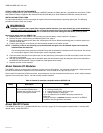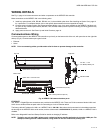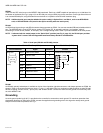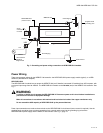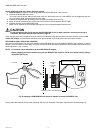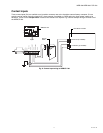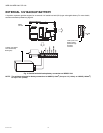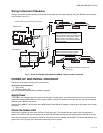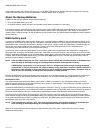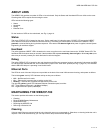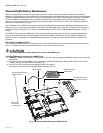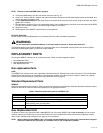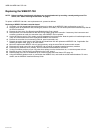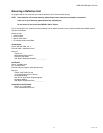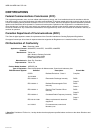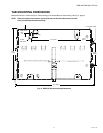WEB-700 WEB-700-O CP-700
95-7776—03 20
If after applying power, the STATUS LED goes out, or if the BEAT LED comes on (steady) and stays lit longer than 2 minutes,
contact your local distributor for technical assistance. See also “About LEDs” on page 21.
About the Backup Batteries
A WEB/CP-700 controller has two different backup batteries:
• An on-board NiMH battery pack, and
• An optional external, sealed lead-acid, rechargeable backup battery (or batteries). See below.
For continuous system operation during loss of primary power (to the NPB-PWR-UN-H module powering the unit), unless power
loss is only a few seconds, both batteries should be installed. Station alarms are generated if either battery is uncharged or
unable to hold a sufficient charge, as well as whenever primary power is lost. You should always investigate any alarm related to
backup batteries.
NiMH battery pack
A custom 10-cell NiMH (nickel metal hydride) battery pack is installed inside the WEB/CP-700, mounted atop the shield, and is
secured by a metal bracket and two kep nuts. This battery allows the controller to continue station operation (only) through very
short power bumps, meaning a few seconds in duration. In the case of a longer outage, the NiMH battery provides enough run
time for the unit to backup data and then shutdown. Typically, this process takes about one minute. Shutdown occurs
automatically, after data is backed up to on-board flash memory.
Upon startup (boot), a test of the NiMH battery is performed. A system alarm is generated if the NiMH battery voltage level is
found to be bad. A charge is also initiated upon startup, which lasts from 3 hours minimum, and can range up to 18 hours if the
battery is completely discharged. During this NiMH battery charge period, neither the NiMH battery or the external backup battery
is tested. After the startup NiMH charge period, a periodic test of both batteries occurs, and the appropriate battery alarm is
generated is either battery is found to be bad.
NOTE: If the last NiMH battery test was “bad,” upon loss of primary power the controller performs an immediate shut-
down, backing up data and powering off (including attached readers, and expansion modules).
A NiMH battery characteristic is to lose charge if not left in charge mode (trickle charge). Leaving the battery
unconnected, or the unit powered off, will cause the battery to fully discharge in a matter of weeks. Note that in
the case of a new controller, it ships from the factory with a completely discharged battery. Therefore, allow at
least 18 hours for the battery to charge after the controller is initially powered.
Replace the NiMH battery pack approximately every three years, or more often if the unit is in a high temperature environment.
For more information on the use and replacement of the battery, refer to Required NiMH Battery Maintenance, page 22.
BACKUP BATTERY
The optional sealed lead-acid backup battery (part number 712BNP) is an external, 12V, rechargeable battery (or multiple
batteries) sized to operate the system during loss of primary power, for some duration. This includes the controller, as well as
power to attached I/O expansion modules.
Connect the backup battery to the controller using a 2-position connector—see Fig. 10, page 18. Whenever primary-powered, the
controller supplies a constant “trickle” charge to this battery, at 200mA maximum. At startup (boot), a test of the backup battery is
performed, as well as a periodic test. A system alarm is generated if a battery test deems the backup battery to be bad.
Providing that the backup battery has tested good, upon loss of primary power the system operates from this backup battery
power until the charge level of the on-board NiMH battery pack reaches 0. Note that both batteries discharge in parallel. However,
as the sealed lead-acid backup battery capacity is much greater, the NiMH battery pack discharges much slower than if these
backup battery(ies) were bad or not present.
NOTE: If the backup battery test was “bad,” upon loss of primary power, the controller performs an immediate shut-
down, backing up data and powering off (including attached readers, expansion modules).
Replace the sealed lead-acid backup battery(ies) approximately every three years, or more often if the unit is in a high
temperature environment.



